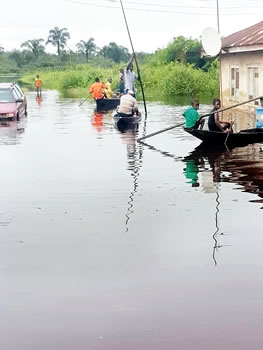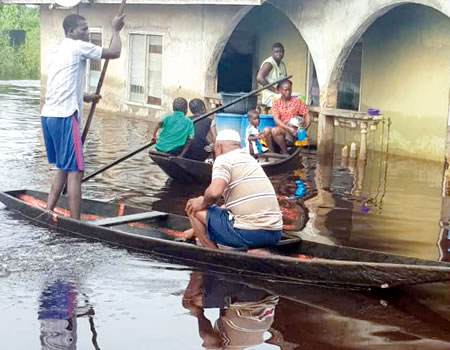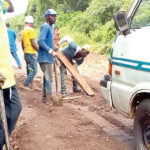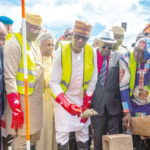She must be in her mid-sixties, so you would think on seeing her for the first time. We later learnt she is way younger. Harsh times and bad seasons seem to be the reason for her wrinkled skin. Coarse hands and bloodshot eyes and creeping gray hairs on her head make a liar of whoever says she is not fifty yet.
A casual visitor will call her a senior citizen, a grandmother if not a great grandma.
PDP, Atiku plotting to malign Supreme Court Justices, APC alleges
Three young people perched hungrily on different parts of a canoe as we got closer. Two had torn shirts covering their black frail shoulders. The third, not out of any act of masochism but lack, had nothing on his tiny frame. She sat on the tipping edge of the boat. Fearlessly busy with whatever it is she was doing. Humid, fouled air blew back and forth.
Two polyethylene bags stood side by side in the centre of the canoe. One was opened and from it clothes of different colours could be seen.
At the background was an almost fully submerged house. The brownish roof and the house beam the only visible means of recognition.
The canoe of about 3 meters in length is their new floating home, it is apparent. It has three diagonal planks nailed at intervals from the front to the back at a parallel distance of less than a meter each. Between the last two flat planks, the only visible kitchenware in the one canoe apartment was a kerosine stove. On it was a dark black pot. Soothe of years have turned what was once a shining pot into a black caricature.
She was stirring the whitish content of the pot frantically when we approached in another small canoe. Her own canoe was tied to the frame of the roof of what was before now her home. It was lying more than half of its height inside the now stagnant flood, an overflow of the rivers into Igbokoda, the headquarters of Ilaje Local Government Area of Ondo State.
She was preparing ‘pupuru,’ a common delicacy of the people of the Southern part of what is known as the Sunshine State, we got to know. For months, it has been torrents and torrents of rain. Many have wondered if the sun will ever shine again.
Through with the preparation of the flour into desired paste and fluffiness, she took a smaller pot from the right side of the kerosine stove, dished out what was some sort of soup into a large plate and before any invitation to the ‘table’, the three young people had taken position. It could not have been dinner, It obviously was also not lunch. By the reading of the time on my phone, it was a few minutes past the hour of four.
In a jiffy, the ‘pupuru’ in the pot was gone. But that was not after two different servings of the soup from the other pot had rendered that empty too. The children who, from a casual observer, could not be more than the age range of 5-9, withdrew to their parts of the boat. Each got busy with something that looked like nothing to my eyes. The mother began the process of cleaning up. Water, brackish, colored water drawn from the flood was used to wash and rinse the plate and the black pot. There was no drinking water as they had none after the meal. She told us later that they had to paddle further upland to buy water to drink.
Done with washing the dishes, she tucked the former pot of soup, the washed black pot and the washed plates under the flat board that was not long ago the dining table. That appears to be a signal that no more meals would be cooked that day. It was after then that she looked in our direction. That was when she truly saw us. That was when she saw the attention we had been paying to her and her children.
She smiled again. Was it a smile in embarrassment or out of confusion? Guilt like droplets of water splashed over me. But then, I braved it. I had to record this for others to read.
The white set of teeth exposed by the reason of her smile was a contrast to the dirt that was the water around us all. The clothes she had on was a sad uncomplimentary insult of her beauty in the midst of ugliness.
The smiling face was of a woman who had hope, energy and promise. With the smiles gone, the pain, the agony, the hopelessness returned and gloom came with full force back to her.

We approached her. The paddler of my canoe and I. I spoke the dialect as best as I could. My Ikale and her Ilaje dialects are like identical twins. Only the initiate know the difference. In fact, to the upland dwellers of Ondo State and other Yoruba across the south west, we are one and the same. But the Ikale do not suffer the direct impact of perennial sea incursion as much as the Ilaje. Ikale communities are not being swept away in acres upon acres by the rampaging sea. Only a few acres here and there.
Only those who feel it know it.
Madam Adura, our woman told us she is in her late thirties! She has been married for about ten years. Her husband has changed address after fishing had become an impossible profession owing to the combined impacts of pollution and climate change. Like her husband, the fishes have found more convenient abodes from the waters, she said. Where could be more convenient for the fish than water? We wondered in silence.
She did not need to tell us any further story. Long before the water from her eyes merged with the water upon which her homes stand, we got her story.
The mattress on which they once slept was on the roof. Soaked as the torn sofas. A half broken standing mirror was lying on one of the sofas as two paddles.
Those were her belongings, she said. The rest were gone. Buried in the flood. She has lived for the last five days in the canoe. Neighbors have either moved away or continued life in their own canoes. Some of same size as Adura and a few others bigger.
At night, the flat boards on the canoe are removed and the family is huddled inside the boat and covered with Ankara wrappers till the next morning. The cold is better imagined she said. The danger palpable, she added. Another heavy rain and the old house could be submerged. And with it the anchor that holds the canoe could go.
A school free holiday till further notice have been declared by government. The pretense called relief materials were not available and when available not sufficient. Needed personal succor may never come till the flood water recedes. We could only watch and go. We are like the hyacinth floating by, mere additions to the unwanted traffic of the invading waterway.
The traditional ruler of Igbokoda, a former student leader, lawyer and now monarch, Oba Afolabi Odidiomo was seen paddling to and from the flooded streets. His palace, at one time a place of refuge, has also been submerged in part. His feeble effort to help is far too little and so may never be felt by many.
The community no longer looks up to him for help, they pray that God sends help to him. He, like them, suffer similar fate. Yet, there is no where to run. Each man is left to paddle his own canoe till the earth swallows the mass of water that has taken over some of the streets of Igbokoda.
And by then, nothing would be left of the submerged effects of Madam Mariam and her likes.
The rest of the world may live in denial of the rampaging effect of climate change. The government may live by denying its planlessness, Madam Adura and her likes, in Igbokoda and many other flooded settlements of the riverine arrears of Ondo state, will live being denied a life better than one being lived in a canoe.
Akinsola wrote from Ondo State.






